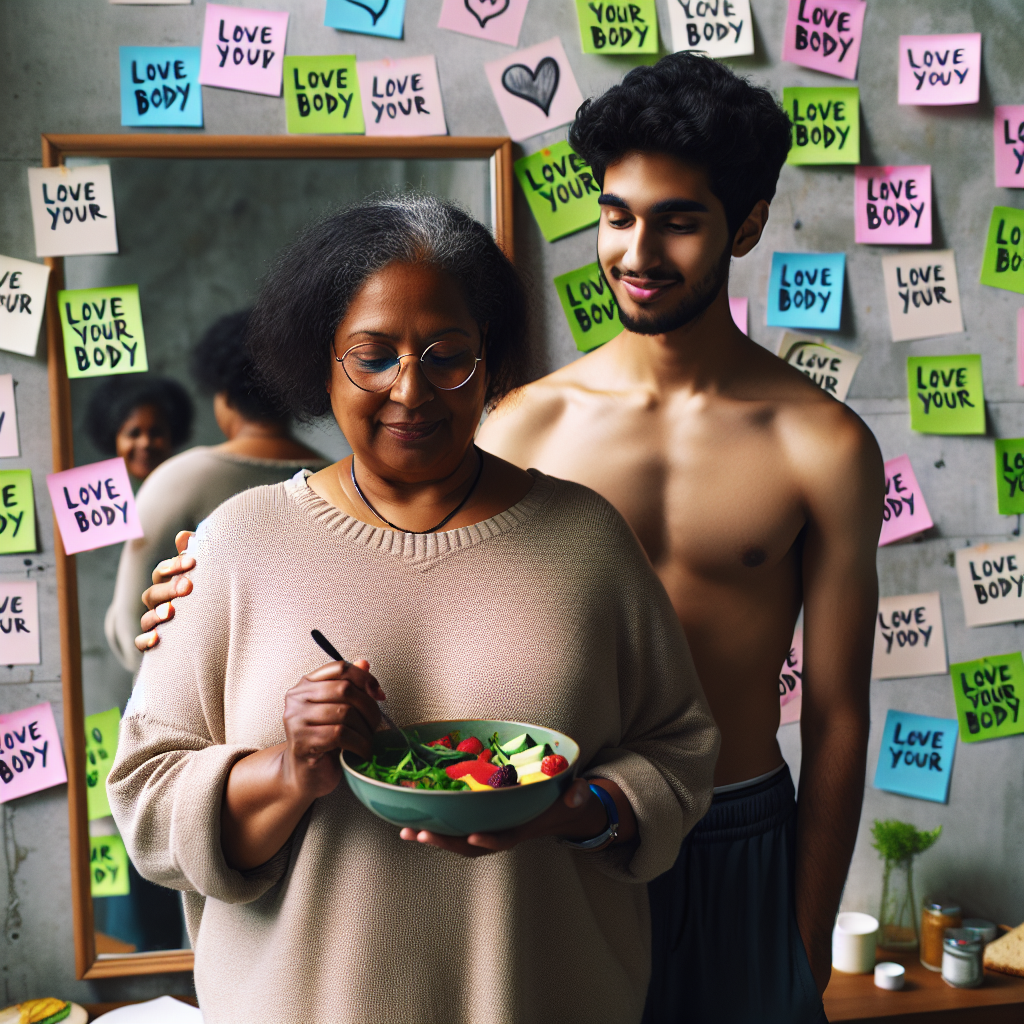-
Table of Contents

“Embrace Every Step: Celebrating Strength and Self-Love in Recovery”
Introduction
Promoting body positivity for a loved one recovering from an eating disorder is a crucial aspect of their healing journey. This process involves fostering a supportive and accepting environment that encourages self-love and a healthy relationship with one’s body. By emphasizing the importance of inner qualities over physical appearance, offering consistent emotional support, and challenging societal beauty standards, we can help our loved ones rebuild their self-esteem and develop a more positive body image. This compassionate approach not only aids in their recovery but also strengthens the bond of trust and understanding, paving the way for a healthier and happier future.
Empowering Your Loved One: Practical Steps to Promote Body Positivity During Eating Disorder Recovery
Supporting a loved one recovering from an eating disorder is a journey that requires patience, understanding, and a commitment to fostering a positive environment. One of the most crucial aspects of this journey is promoting body positivity, which can significantly impact their recovery process. To empower your loved one, it is essential to adopt practical steps that encourage a healthy relationship with their body and self-image.
First and foremost, it is important to educate yourself about eating disorders and the challenges associated with recovery. Understanding the complexities of these conditions can help you provide informed and compassionate support. By learning about the psychological and physical aspects of eating disorders, you can better empathize with your loved one’s experiences and avoid inadvertently reinforcing negative behaviors or thoughts.
Communication plays a pivotal role in promoting body positivity. Engage in open and non-judgmental conversations with your loved one, allowing them to express their feelings and concerns. Listen actively and validate their emotions, showing that you respect their experiences. Avoid making comments about their appearance, weight, or food choices, as these can be triggering. Instead, focus on their strengths, achievements, and qualities that make them unique and valuable.
Creating a supportive environment is another key step. Surround your loved one with positive influences, whether it be through social media, literature, or personal relationships. Encourage them to follow body-positive accounts and read books that promote self-acceptance and diversity. Additionally, be mindful of the language used in your household. Avoid diet talk, body shaming, or any discussions that may perpetuate harmful beauty standards. Instead, celebrate all body types and emphasize the importance of health and well-being over appearance.
Encouraging self-care practices can also significantly contribute to body positivity. Help your loved one develop a self-care routine that includes activities they enjoy and that make them feel good about themselves. This could involve physical activities like yoga or dancing, creative outlets such as painting or writing, or relaxation techniques like meditation and deep breathing exercises. By prioritizing self-care, your loved one can reconnect with their body in a positive and nurturing way.
Moreover, it is essential to model body positivity yourself. Demonstrate a healthy relationship with your own body and food, as your loved one is likely to look to you for cues. Show self-compassion and avoid negative self-talk about your appearance. By embodying these principles, you can inspire your loved one to adopt a similar mindset.
Professional support is also invaluable in the recovery process. Encourage your loved one to seek help from therapists, dietitians, or support groups specializing in eating disorders. These professionals can provide tailored guidance and strategies to promote body positivity and overall well-being. Additionally, consider joining a support group for families and friends of individuals with eating disorders. This can offer you valuable insights and coping mechanisms to better support your loved one.
Lastly, celebrate progress, no matter how small. Recovery from an eating disorder is a gradual process, and acknowledging each step forward can boost your loved one’s confidence and motivation. Celebrate their efforts and remind them of their resilience and strength. By focusing on their journey rather than the destination, you can help them cultivate a more positive and accepting relationship with their body.
In conclusion, promoting body positivity for a loved one recovering from an eating disorder involves a multifaceted approach that includes education, communication, a supportive environment, self-care, modeling positive behavior, professional support, and celebrating progress. By taking these practical steps, you can empower your loved one to embrace their body and foster a healthier, more positive self-image.
Creating a Supportive Environment: How to Foster Body Positivity for Someone Recovering from an Eating Disorder
Creating a supportive environment for a loved one recovering from an eating disorder is a crucial step in fostering body positivity and aiding their journey towards healing. The path to recovery is often fraught with emotional and psychological challenges, and the role of a supportive network cannot be overstated. By understanding the nuances of body positivity and implementing thoughtful strategies, you can significantly contribute to their well-being and self-acceptance.
First and foremost, it is essential to educate yourself about eating disorders and the importance of body positivity. Knowledge is empowering, and understanding the complexities of these conditions can help you provide more empathetic and effective support. Recognize that eating disorders are not merely about food or weight; they are deeply rooted in emotional and psychological struggles. By acknowledging this, you can approach your loved one with the compassion and sensitivity they need.
Communication is a cornerstone of creating a supportive environment. Engage in open, non-judgmental conversations with your loved one, allowing them to express their feelings and experiences without fear of criticism. Active listening is key; it shows that you value their perspective and are genuinely interested in their well-being. Avoid making comments about their appearance, weight, or eating habits, as these can be triggering and counterproductive. Instead, focus on their strengths, achievements, and the qualities that make them unique.
In addition to fostering open communication, it is important to create a positive and inclusive atmosphere. Surround your loved one with affirmations and messages that celebrate diversity in body shapes and sizes. This can be achieved through various means, such as displaying body-positive artwork, sharing inspiring stories of individuals who have overcome similar struggles, or even curating a social media feed that promotes self-love and acceptance. By doing so, you help counteract the pervasive societal pressures that often contribute to negative body image.
Moreover, encourage activities that promote self-care and holistic well-being. Physical activities such as yoga, dancing, or gentle walks can be beneficial, as they emphasize the joy of movement rather than the pursuit of a particular body shape. Creative outlets like painting, writing, or playing music can also provide a therapeutic release and a sense of accomplishment. The goal is to help your loved one reconnect with their body in a positive and nurturing way.
It is also vital to be mindful of your own attitudes and behaviors regarding body image and food. Model healthy relationships with food and exercise, demonstrating that these aspects of life can be enjoyed without guilt or obsession. Your actions can have a profound impact, as your loved one may look to you for cues on how to navigate their own recovery journey.
Furthermore, professional support should not be overlooked. Encourage your loved one to seek help from therapists, dietitians, or support groups specializing in eating disorders. These professionals can provide tailored guidance and coping strategies that complement the support you offer at home. Being an advocate for their access to such resources shows your commitment to their recovery and reinforces the message that they are not alone in this journey.
In conclusion, fostering body positivity for someone recovering from an eating disorder requires a multifaceted approach that combines education, empathetic communication, a positive environment, and professional support. By embracing these strategies, you can create a nurturing space that empowers your loved one to embrace their true self and embark on a path of healing and self-acceptance. Your unwavering support and understanding can make a world of difference, inspiring them to believe in their worth and potential.
Q&A
1. **Question:** How can I support a loved one recovering from an eating disorder in developing a positive body image?
**Answer:** Encourage open communication, avoid making comments about their appearance, and focus on their strengths and qualities unrelated to their body. Support their treatment plan and celebrate non-appearance-related achievements.
2. **Question:** What are some activities that can help promote body positivity for someone recovering from an eating disorder?
**Answer:** Engage in activities that promote self-care and self-expression, such as yoga, art therapy, or journaling. Encourage participation in hobbies and interests that make them feel good about themselves and foster a sense of accomplishment.
Conclusion
Promoting body positivity for a loved one recovering from an eating disorder involves creating a supportive and non-judgmental environment, encouraging self-acceptance, and focusing on health rather than appearance. It is essential to avoid negative comments about body image, provide positive reinforcement, and engage in activities that promote self-esteem and well-being. By fostering a compassionate and understanding atmosphere, you can help your loved one build a healthier relationship with their body and support their journey towards recovery.



